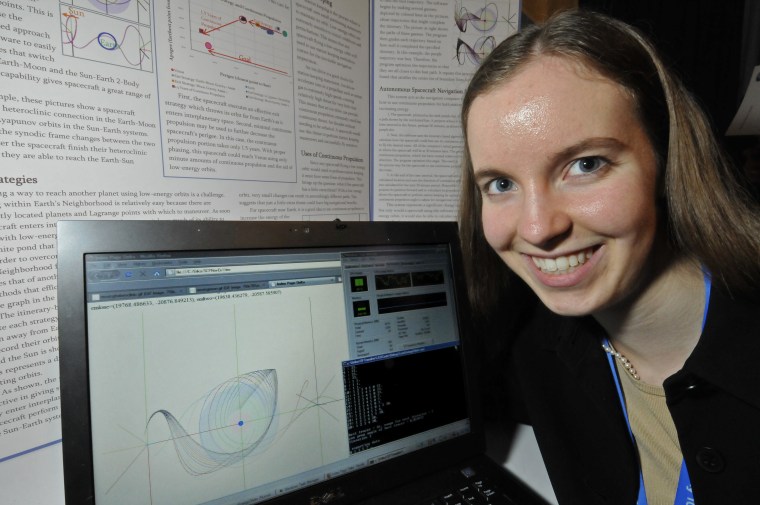An 18-year-old whiz kid from New Mexico has won the $100,000 top award in the Intel Science Talent Search for developing a software navigation system to improve spacecraft travel through the solar system.
The award, given to Albuquerque Academy senior Erika DeBenedictis, was announced Tuesday night at the conclusion of the annual science competition, sponsored by Intel Corp. and the Society for Science and the Public.
Forty finalists competed in Washington during the six-day event, and each finalist received at least $7,500 in awards.
DeBenedictis' research played off the fact that the gravitational influence and movements of planets create “easy transit routes” through the solar system. Plotting a course that uses such routes can help spacecraft move faster and use less fuel. The software that DeBenedictis developed is consistent with NASA's concept of developing "Interplanetary Superhighways" for future space probes.
DeBenedictis has won honors in the past from the Intel International Science and Engineering Fair, the Davidson Institute for Talent Development and the Siemens Competition in Math, Science and Technology.
Other students were honored for projects ranging from an educational computer game to a study of the early universe.
“These 40 Intel Science Talent Search finalists demonstrate that we have the capability in this country to cultivate the next generation of innovators, scientists and entrepreneurs,” Paul Otellini, Intel's president and chief executive officer, said in a news release announcing the results. “These young scientists are proof that curious, eager minds coupled with inspiring, knowledgeable teachers are the foundation for world-changing innovation.”
Other top honors from the competition include:
- Second-place: David Liu, 18, of Saratoga, Calif., received a $75,000 award for developing a system to recognize and understand digital images. David’s work has already been used to examine aerial images to identify hazards to buried oil pipelines and could also be used to enable unmanned aerial vehicles and Web-based image searches.
- Third place: Akhil Mathew, 18, of Madison, N.J., received a $50,000 award for his math project on Deligne categories, a setting for studying a wide range of algebraic structures with ties to theoretical physics.
- Fifth place: Eric Brooks, 16, Hewlett, N.Y., received a $30,000 award for his research studying racial genetic factors that may affect the spread of prostate cancer.
- Seventh place: Benjamen Sun, 17, of Grand Forks, N.D., received a $25,000 award for work studying how sand, dust and other debris on city streets can collect pollutants from rain and thus contaminate city water sources.
- Eighth place: Katherine Rudolph, 18, of Naperville, Ill., received a $20,000 award for a math project that investigated dense packing of identical spheres, the results of which can be used in fields from chemistry to cryptology.
The remaining 30 finalists each received at least $7,500 in awards.
This year's Intel Science Talent Search finalists hail from 18 states and represent 36 schools. Of the 1,736 high-school seniors who entered the Intel Science Talent Search 2010, 300 were announced as semifinalists in January. Of those, 40 were chosen as finalists and invited to Washington to compete for the top 10 awards.
The Intel Science Talent Search encourages students to tackle challenging scientific questions and develop the skills necessary to solve the problems of tomorrow. Over the past 68 years, Science Talent Search finalists have gone on to win seven Nobel Prizes, two Fields Medals, three National Medals of Science and 11 MacArthur Foundation Fellowships.
Society for Science and the Public, a nonprofit organization dedicated to public engagement in scientific research and education, has owned and administered the Science Talent Search since its inception in 1942.
This report is based on a news release from the Intel Science Talent Search.
